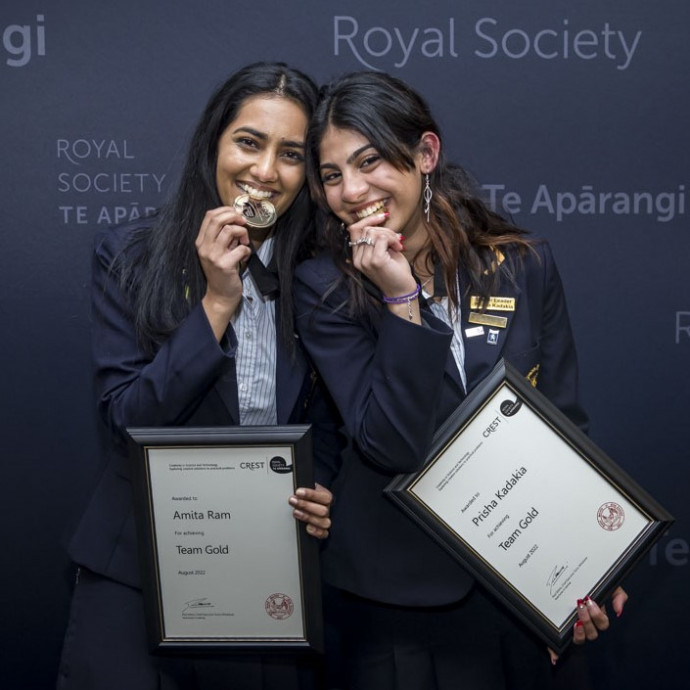2022 | Amita Ram and Prisha Kadakia

Amita Ram and Prisha Kadakia from Epsom Girls Grammar School, Auckland were presented with their Team Gold CREST award recently for their project on how increasing ‘Emotional Intelligence’ (kare ā-roto maramarama) increases academic engagement.
Mentor: Dr. Fiona Ell
Representative teacher: Mayada Ghanim
Gold CREST medal presented by: Dr Brent Clothier FRSNZ
Amita Ram and Prisha Kadakia's Executive Summary states:
Emotional intelligence is "the ability to monitor one's own and other people's emotions, to discriminate between different emotions and label them appropriately, and to use emotional information to guide thinking and
behaviour.1
" The term ‘Emotional Quotient’, (EQ) is a way to measure emotional intelligence, just like how IQ (intelligence quotient) measures cognitive intelligence. AE is an indicator that combined academic identification (which refers to getting along with teachers, having an interest in the subject matter, and related behaviours and attitudes) and academic participation (which captures the student's work effort both inside and outside of school, including hours spent on homework, meeting deadlines, not skipping classes, and so on) 2.
The aim of this study was to investigate Emotional Intelligence and the AE of students. The first step after finding a goal was to come up with a way to measure the research, so we designed this intervention. We required voluntary participation of students who were recruited from year 11 from Epsom Girls Grammar School. The students were then split into two groups, a non- intervention group (Controlled (n=46)) who were students that did not undergo the intervention and the pioneer group (Pioneers (n=30)) on whom the intervention was conducted. We measured the initial AE and EQ of all students before the intervention was conducted by giving out an initial AE and EQ questionnaire to the pioneers and the non-intervention group. Then the EQ and AE were measured again for the pioneers after the intervention and measured for the non-intervention group as well. This ensured a matched database was kept and there were pre and post
measures for each student. The intervention created was conducted on the pioneers throughout a period of 6 weeks whereas the non- intervention group were given only the initial and final questionnaires. This was for comparison in order to see if the intervention did work. The Levels of EQ and AE were attempted to be measured through specifically designed questionnaires. The intervention undertaken by the Pioneer group
of the sample was heavily influenced by the studies of Bar-on, Carroll, and Boekaerts on AE and their factors, many of which were very similar to the aspects of EQ. Throughout the intervention students were given questionnaires to track their progress. These weekly assessments were used to modify and personalise the intervention for the Pioneers according to the RULER approach of teaching EQ, in an attempt to achieve maximum effectiveness of the intervention, all in the hope of increasing the aspects of EQ that consequently increases AE.
We hypothesised that increasing EQ of students would cause an increase in academic engagement. However our results showed that there was no group difference in the EQ so our intervention did not seem to increase the EQ of the pioneers as hypothesised. However AE of the pioneers did seem to increase in comparison to the non intervention group. Our results suggested that the intervention is heavily backed by the theory of EQs’ role in academic engagement, hence achievement can explain the results from the data.
1 (n.d.). History-of-EQ - Emotional-intelligence. from https://www.emotionalintelligencecourse.com/history-of-eq/
2 "Definition of "Academic engagement"." 14 Dec. 2011, https://www150.statcan.gc.ca/n1/pub/81-004-x/2011004/def/academic-academique-eng.htm. Accessed 17 May. 2022.
